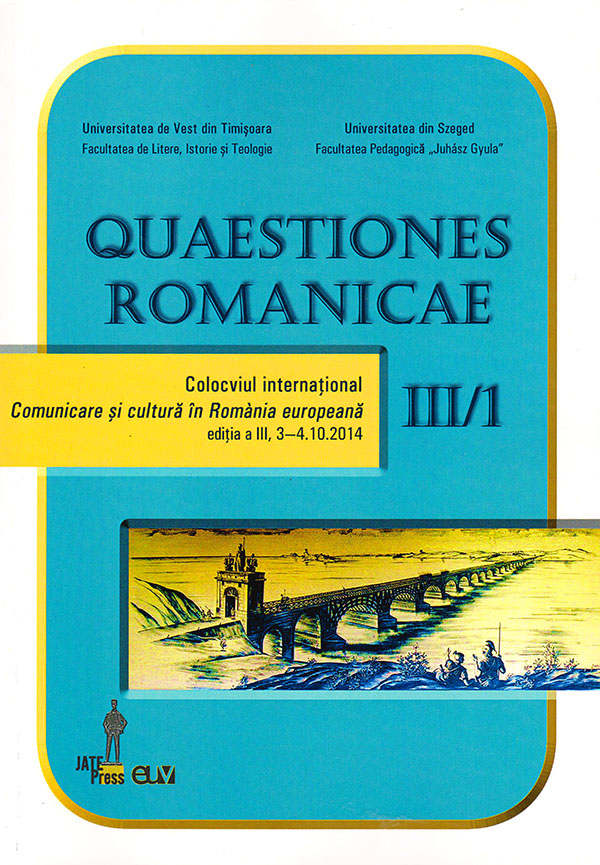O voce lirică între Occident şi Orient: Cristian Popescu
Abstract (A Lyrical Voice between West and East: Cristian Popescu): In a time when Romania was characterized by lyrical effervescence, immediately after the Fall of the Berlin Wall, a poet was to affirm himself as a voice defined, sui-generis, by a local, Balkan background, based on a Mitteleuropa type of humanist education. That very writer, Cristian Popescu, who practically turned into a legend due both to an early affirmation marked by a percussive verse, and a quick and tragic death, would become a landmark meant to inspire waves of creative authors in the last years. The features of Cristian Popescu’s poems express a special sensitivity which goes back to the eighteenth century when, under the Phanariote influence, with Turkish cultural sources, filtered through the so-called little French poetry, a vigorous reflection of life songs would start and be remarked. On the other hand, the philologist structure of the poet allows him to mix the meridional layer of the artistic reflection of life with the western reflection, metaphysically influenced by German and French sources. Hence, the poet’s striking originality as a typically postmodernist palimpsest author, with a clear presence of both the world’s secondarity lament, which is to be found in the social periphery bitterness, and the clippings from the great cognitive theories of humanity, which are melted in expressions that promote the unusualness of the logic which places the human being into a desirable coherence. Our enterprise aims at identifying the sources of the durable presence of the Levantine mentalities in a certain area, the Oriental one, represented by Romània, as well as their continuous interference and cohabitation with the pressures generated by, first of all, the French intellectual influences and, secondly, by the German ones.
Keywords: Levant, Mitteleuropa, secondarity, metaphysics, life song.
Rezumat: Într-o perioadă de efervescenţă lirică a României, imediat după căderea Zidului Berlinului, un poet avea să se afirme ca o voce care sintetiza, sui-generis, un fond balcanic, autohton, cu o educaţie umanistă de tip Mitteleuropa. Acel scriitor, Cristian Popescu, intrat, practic, în legendă atât datorită impunerii timpurii, prin percutanţa versurilor, cât şi prin dispariţia rapidă şi tragică, avea să devină un reper pentru valurile creatoare din ultimii ani. Mărcile poeziei lui Cristian Popescu ţin de o sensibilitate care urcă până la secolul al XVIII-lea, când, sub influenţa fanariotă, cu izvoare culturale turce, filtrate prin aşa-zisă mica poezie franceză, se conturează şi se remarcă reflecţia viguroasă a cântecului de lume. Pe de altă parte, structura de filolog a poetului îi permite să mixeze stratul meridional al reflectării artistice a vieţii cu reflecţia occidentală, colorată metafizic prin surse germane şi franceze. De aici rezultă originalitatea frapantă a scriitorului, ca autor al unui palimpsest, tipic postmodernist, din care nu lipsesc lamento-ul secundarităţii lumii, regăsibil în amărăciunea periferiei sociale, şi nici decupajul din marile teorii cognitive ale omenirii, topite în expresii care insolitează logica situării fiinţei într-o dezirabilă coerenţă. Demersul urmăreşte să identifice izvoarele prezenţei durabile a mentalităţilor levantine într-o anumită parte, cea orientală, a Romàniei, ca şi interferenţa şi coabitarea lor neîntreruptă cu tensiunile generate de influenţele intelectuale mai întâi franceze, apoi germane.
Cuvinte-cheie: Levant, Mitteleuropa, secundaritate, metafizică, cântec de lume.
